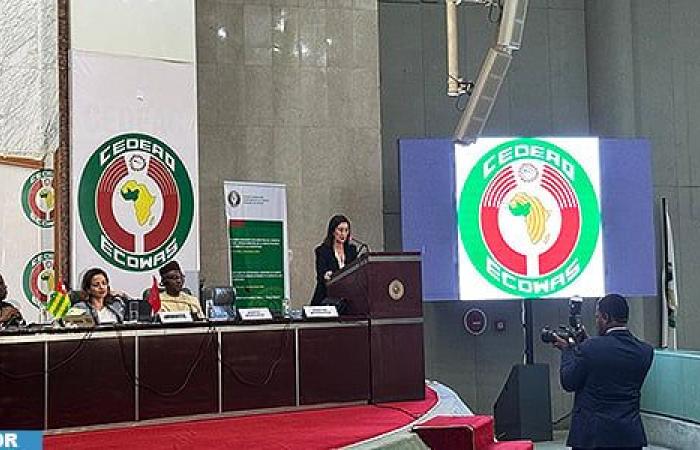
Friday, November 1, 2024 at 5:12 p.m.
Abuja – The validation meeting of the Intergovernmental Agreement (IGA) and the Host Government Agreement (HGA), inherent to the unique African Atlantic Gas Pipeline project (Nigeria-Morocco), opened Friday in Abuja, testifies to the commitment of the Community of West African States (ECOWAS) to member countries Morocco, Nigeria and Mauritania, underlined Ms. Amina Benkhadra, Director General of the National Office of Hydrocarbons and Mines ( ONHYM).
Mrs. Benkhadra, who spoke on behalf of ONHYM, alongside her partner the Nigerian Petroleum Company Limited (NNPC), during this ministerial meeting praised the commitment of ECOWAS and member countries for the exemplary coordination of the process of examination of the texts of the IGA and the HGA as well as for all the meetings held in Marrakech, Rabat then in Abidjan and Lagos.
“We are meeting today to validate the IGA and the HGA at the level of ministers, which will mark a decisive step towards its official signature,” she welcomed, indicating that these agreements will create an environment conducive to the successful implementation of the project and would mark a significant step towards regional sovereignty.
These agreements, she continued, symbolize “our common ambition to strengthen regional integration and energy cooperation, while sharing the vision of a more united and prosperous Africa”.
On another note, Ms. Benkhadra recalled that the African Atlantic Gas Pipeline project, born from a shared vision between HM King Mohamed VI and the Presidents of Nigeria and from a mutual commitment between Morocco and Nigeria, has the ambition to stimulate collective economic growth and development in the West African region.
“By accelerating electrification, promoting energy self-sufficiency, creating wealth and jobs, and developing industrial sectors, this project can profoundly improve living conditions and generate economic opportunities throughout the region,” she said.
In his eyes, beyond ensuring energy security and autonomy in West Africa, the project embodies an initiative deeply rooted in Africa, with the ambition of promoting sustainable growth and positive transformations in the level of the region.
Ms. Benkhadra did not fail to note that the construction and operation of this gas pipeline should attract significant foreign investments, a substantial part of which will be dedicated to local companies.
At the international level, the Gas Pipeline is of strategic importance in the sense that it offers Europe a viable alternative to diversify its sources of gas supply, and further secure its supply, she explained, noting that with a potential export of 15 billion m3 per year, the gas pipeline will contribute to strengthening Europe’s energy security.
Since its launch in 2017, the African Atlantic Gas Pipeline project, emanating from the enlightened vision of HM King Mohammed VI and the Presidents of Nigeria, has made significant progress.
The detailed engineering studies carried out by world-renowned service providers were completed in March 2024, representing a significant step forward towards the realization of this project, recalled Ms. Benkhadra, noting that the concept is robust and the macroeconomic data demonstrate the profitability of the project and its competitiveness.
Currently, the survey studies of the northern segment are underway, while those of the southern segment will begin shortly, she added, noting that the contracts for the environmental and social impact studies (ESIA) have been awarded and the Field work has already started.
These studies, explains Ms. Benkhadra, will make it possible to refine the implementation plan, integrating all environmental and social aspects to ensure compliance with the highest standards.
The Abuja meeting, to which Mauritania was also invited, aims to adopt the intergovernmental agreement on the African Atlantic Gas Pipeline (Nigeria-Morocco) which will be submitted for signature by the Heads of State of member countries. of ECOWAS, Morocco and Mauritania.
Organized by the ECOWAS Commission, this joint meeting of Ministers in charge of Energy and Hydrocarbons, extended to the Ministers in charge of Hydrocarbons of Morocco and Mauritania, was preceded by a meeting of sectoral experts. It is part of the statutory process of adoption of community texts at ECOWAS. These are the Draft Intergovernmental Agreement (IGA) concerning the African Atlantic Gas Pipeline (AAGP) and the Draft Agreement with the Host Government (HGA) concerning the African Atlantic Gas Pipeline (AAGP) annexed to the IGA.





